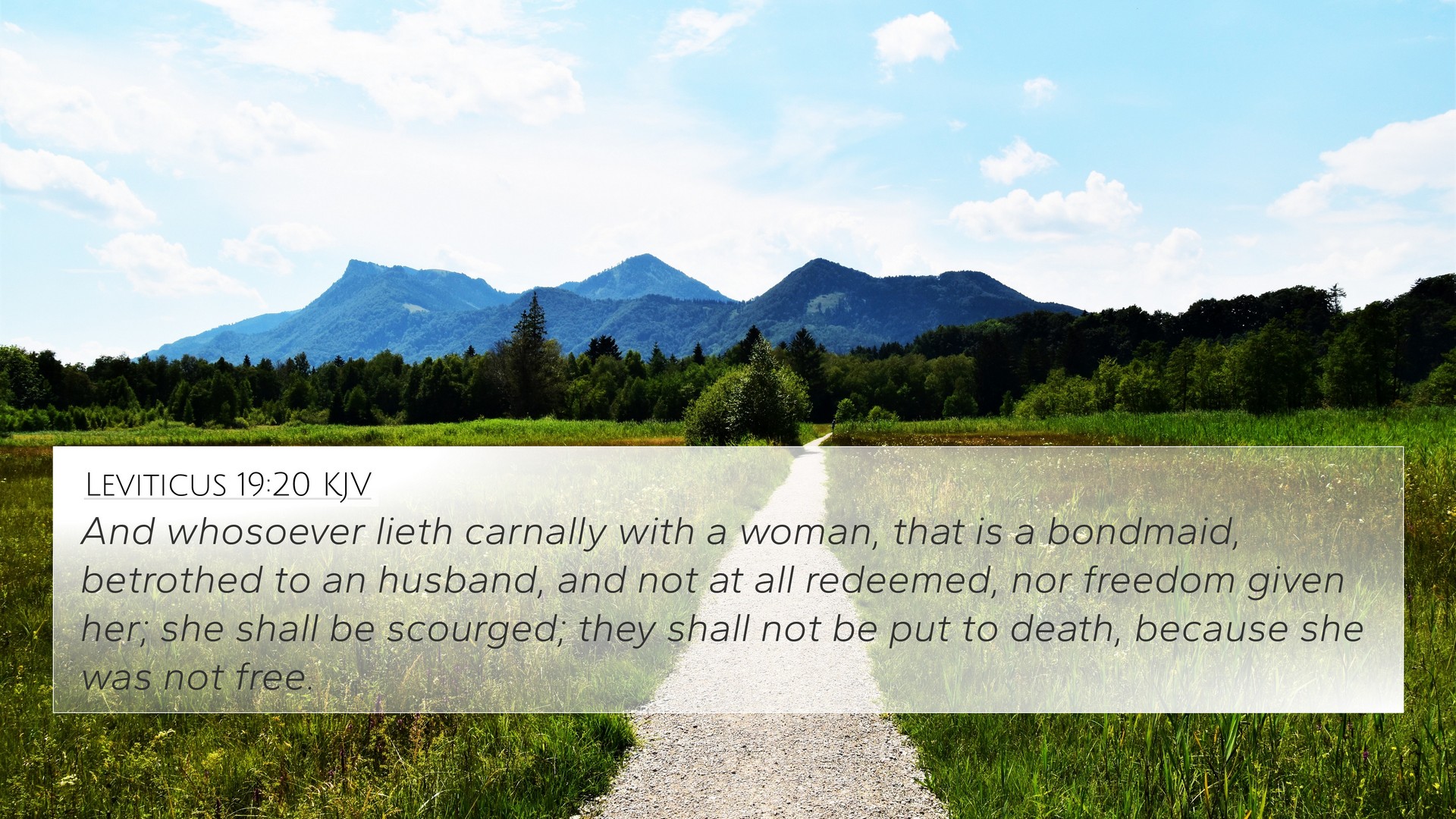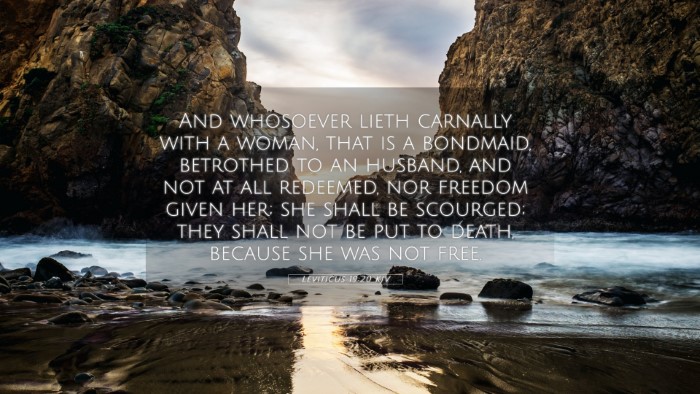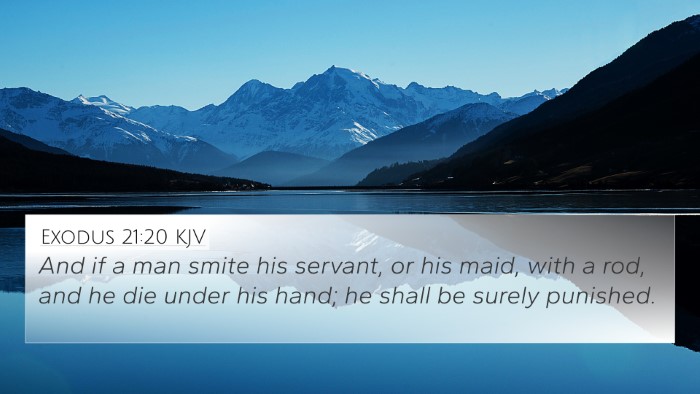Understanding Leviticus 19:20
Leviticus 19:20 states: "And whosoever lieth carnally with a woman, that is a bondmaid, betrothed to a husband, and not at all redeemed, nor freedom given her; she shall be scourged; they shall not be put to death, because she was not free." This verse is part of the Mosaic Law, where specific rules and regulations concerning sexual conduct and moral behavior are established.
Summary of Meaning
This verse addresses the situation of a bondwoman who is engaged to another man. It outlines the consequences for a man who lies with her. The verse highlights several crucial aspects:
- The Condition of Bondage: The woman in context is a bondmaid, indicating she was in servitude and had limited rights.
- Betrothal and Redemption: The verse emphasizes the importance of her betrothal, as she is considered contracted to another man.
- Cultural and Legal Framework: The punishment differs based on her status, indicating a nuanced understanding of justice in the Israelite context.
- Focus on Redemption: The mention of her not being redeemed suggests a need for intervention and justice, showing the value placed on relationships and societal norms.
Commentary Insights
Matthew Henry
Henry emphasizes the sanctity of marriage and the seriousness of sexual sin. He explains that God’s laws reflect His desire for purity and integrity, both personal and communal. The focus on the bondwoman’s status is a reminder of the need for accountability, even for those in servitude.
Albert Barnes
Barnes notes that while the penalty for the man is severe, the lesser punishment indicates the complexities of social status in ancient Israel. He interprets this law as a protective measure for the vulnerable, highlighting God’s concern for those who are least able to advocate for themselves.
Adam Clarke
Clarke provides a detailed exposition on the implications of the bondmaid's situation. He relates this to the broader societal laws and argues for a greater understanding of justice that takes into account the context of each individual’s situation.
Cross-References to Leviticus 19:20
This verse does not exist in a vacuum; it has significant connections throughout the Bible. Here are some relevant cross-references that elucidate the themes within Leviticus 19:20:
- Exodus 21:7-11 - Discusses laws concerning servitude and the rights of female slaves.
- Deuteronomy 22:23-24 - Addresses the punishment for a man who violates an engaged woman.
- Numbers 30:3-5 - Explains the significance of oaths and vows made in the context of marriage.
- 1 Corinthians 6:18 - Paul stresses the seriousness of sexual immorality and its implications for the body as a temple.
- Hebrews 13:4 - Highlights the honor of marriage and the consequences of adultery.
- Ephesians 5:3 - Encourages believers to avoid sexual immorality, linking back to Old Testament laws.
- Matthew 5:27-28 - Jesus echoes the command against adultery, deepening its interpretation.
- Leviticus 20:10 - Outlines strict consequences for adultery, affirming the importance of marital fidelity.
- Romans 7:2 - Discusses the binding nature of marital contracts, linking Old Testament principles with New Testament theology.
- Malachi 2:16 - God expresses His disdain for divorce, emphasizing the sanctity of marriage vows.
Connections and Themes
The connections between these verses and Leviticus 19:20 can enrich our understanding of biblical teachings on fidelity, social justice, and the protection of the vulnerable. These thematic links underline God's consistent message about the importance of relationships and moral conduct. Understanding these connections helps us see the Bible as a unified narrative concerning human behavior and divine expectations.
Tools for Bible Cross-Referencing
To delve deeper into the connections between different Bible verses, various tools are available:
- Bible Concordance: A valuable resource for locating specific verses and their related terms.
- Bible Cross-Reference Guide: Guides that help readers identify parallel verses across Scripture.
- Bible Chain References: Systems that trace themes or ideas throughout the Bible.
- Cross-Reference Bible Study: Methods for studying connected verses systematically.
- Comprehensive Bible Cross-Reference Materials: Extensive resources that map out all significant connections.
Conclusion
Leviticus 19:20, while initially challenging to interpret due to its cultural context, ultimately reinforces timeless moral principles that are echoed throughout the entirety of Scripture. By examining the cross-references and engaging with various commentaries, we can appreciate the richness of biblical teachings and the sophisticated nature of God’s laws.
FAQs
What verses are related to Leviticus 19:20?
Verses related include Exodus 21:7-11 and Deuteronomy 22:23-24, which discuss laws of sexual conduct and the treatment of women.
How do Leviticus 19:20 and 1 Corinthians 6:18 connect?
Both verses address the moral implications of sexual relationships and emphasize the need for integrity and accountability.
Why is cross-referencing Bible verses important?
Cross-referencing helps readers gain a comprehensive understanding of biblical themes and truths, illustrating how different parts of the Bible relate to and support one another.
What tools can help with Bible cross-referencing?
Tools like Bible concordances, cross-reference guides, and Bible study software can assist in identifying and studying these connections.




